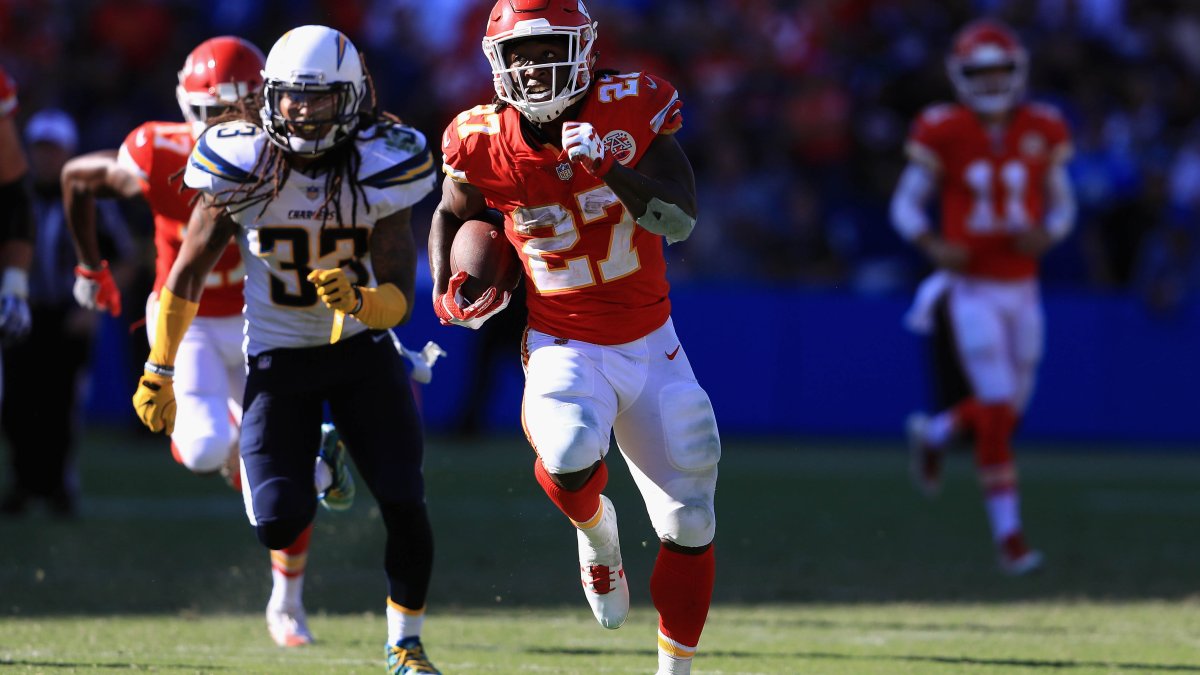(Metrics that Matter is a regular offseason feature that examines some aspect of fantasy through a microscope to dive into the finer details.)
In our last article we looked at tight ends, how frequently they’re asked to block, and how that impacts their fantasy outputs. Today, I wanted to look at the same thing but for running backs.
Before digging into the research, my theory was that running backs who are skilled at pass-blocking are more valuable for fantasy (though the reverse appeared to have been true for tight ends). If a running back struggles in pass protection, the thinking was, they’d be less likely to be used on obvious passing downs, and thus less likely to run routes and draw targets, something incredibly important for fantasy football – and especially in PPR leagues. (The average running back target is worth 17 percent more than the average running back carry in standard leagues, but 91 percent more in PPR leagues.)
For PFF Elite subscribers who have access to our premium stats, you can look at how effective a running back was as a pass-blocker (measured by our pass-blocking efficiency metric) and how frequently a running back was asked to pass-block (pass-blocking snaps as a percentage of total passing snaps) here.
Looking at this list for 2017, two notable names immediately jump out:
Christian McCaffrey was by far our least-efficient pass-blocking running back last season, surrendering 10 pressures on 38 pass-blocking snaps, for a pass-blocking efficiency rating of 78.9. In fact, this was the single-worst PBE rating among all rookie running backs this past decade. He also pass-blocked on only eight percent of his pass snaps, which was the lowest rate among all qualifying running backs.
Just ahead of McCaffrey was fellow rookie Kareem Hunt, surrendering seven pressures on 37 pass-blocking snaps (83.8 PBE). He only pass-blocked on 11 percent of his passing snaps, for the third-lowest rate among qualifying running backs (ahead of only McCaffrey and Le’Veon Bell).
I’m not sure McCaffrey’s poor blocking numbers impacted his receiving usage. Like with Bell in Pittsburgh, Carolina may have turned those potential pass-blocking snaps into more routes for McCaffrey. For Hunt, I suspect it did play a role in his usage, as we frequently saw Charcandrick West step onto this field in obvious passing situations. This was despite Hunt ranking 21st in yards per route run (1.50), while West ranked 47th (0.94) of 55 qualifying.
First, I wanted to see how much rookie running backs improve in pass-blocking efficiency in their sophomore seasons to see whether this should be legitimate concern for the fantasy potential of McCaffrey and Hunt.
Among all similarly ranked rookie running backs (PBE under 90.0, min. 35 pass-block snaps), running backs nearly halved their rate of pressures surrendered per pass-blocking attempt from their first year to the second. On average, the worst rookie pass-blockers fell from 15.8 percent to 8.0 percent, which is actually slightly better than the league average rate. Either rookie running backs do tend to improve as pass-blockers in their sophomore seasons (and dramatically so), or this isn’t a very “sticky” or predictive metric. Routes run per season dramatically increased as well.
Next, I wanted to see if all running backs (not limited to rookies) with similarly poor pass-blocking efficiency numbers (on a similar number of snaps), ran fewer routes in their following season. Indeed, all running backs with at least 35 pass-blocking snaps and a PBE under 90.0 ran 26.7 percent fewer routes in the following season. Though overall (not just at the lowest end of our spectrum) pass-blocking efficiency wasn’t very sticky year over year (with a correlation of just 0.15) and its correlation to routes run in the following season was actually negative.
In conclusion, the data suggest that poor pass-blocking numbers do matter, but only at the polar negative extreme, and not very much at all for rookies. In the cases of Hunt and McCaffrey, I’m optimistic. Both were much more effective at pass-blocking in their final years of college, each recording positive pass-blocking grades and ranking about average in PBE (94.5 for McCaffrey and 95.8 for Hunt on over 50 pass-blocking snaps for each).
I'd be more concerned with the non-rookies to post low PBE numbers last season – mainly LeGarrette Blount (87.2), Alex Collins (88.9), and Melvin Gordon (89.6). Although we’d never expect Blount or Collins to be major factors in the passing game, it could be an issue for Gordon, who ranked seventh in targets (73) last year. Perhaps this could mean less passing-down work for Gordon in 2018, though unless they spend significant draft capital at the position in the draft this won’t be something that plays a major role in my projections.



 © 2025 PFF - all rights reserved.
© 2025 PFF - all rights reserved.